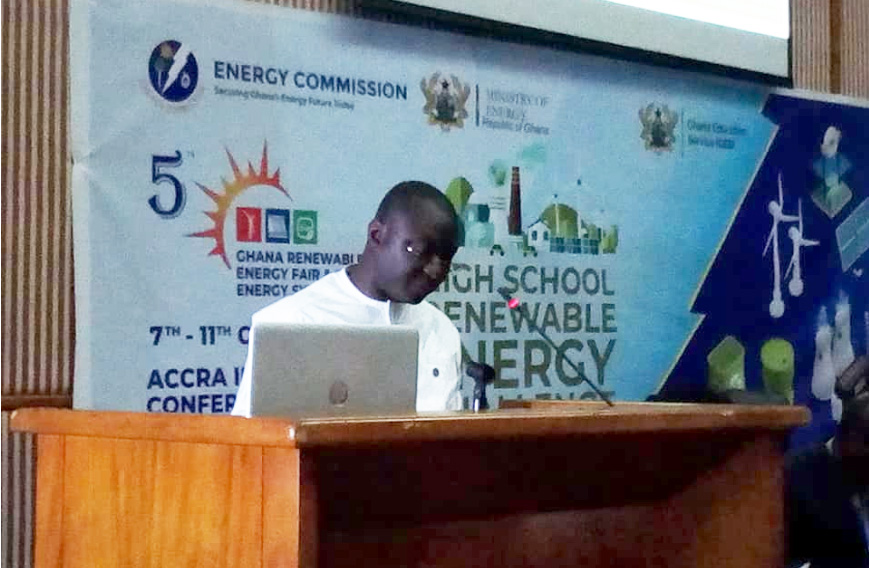 procurement opportunities
procurement opportunities
 documents and reports
documents and reports
MiDA SUPPORTS ENERGY COMMISSION TO ESTABLISH TWO SUSTAINABLE ENERGY SERVICE CENTRES (SESCs)
Ghana’s Energy Commission, with support from the Millennium Development Authority (MiDA), is in the process of setting up two Sustainable Energy Service Centres (SCSEs) in tertiary educational institutions in Ghana, Minister for Energy John-Peter Amewu has revealed.

Dr. Mohammed Amin Adam, Deputy Minister for Energy delivering a speech on behalf of Hon. John-Peter Amewu, Minister for Energy, at the 5th Ghana Renewable Energy Fair and National Energy Symposium in Accra (Photo credit: Energy News Africa)
According to the Minister, Indian-based Development Environment Services Limited (DESL), in association with its partners, will assist to establish and operationalise these centres.
Energy Minister John-Peter Amewu disclosed this in a speech read for him by his Deputy in charge of Petroleum, Dr. Mohammed Amin Adam, at the 5th Ghana Renewable Energy Fair and National Energy Symposium held at the Accra International Conference Centre (AICC).
The 5-day Renewable Energy Fair and National Energy Symposium is under the theme: ‘ Opportunities for Renewable Energy and Energy Efficiency in a constrained energy sector.’
Source: energynewsafrica.com
Context for development of the Sustainable Energy Services Centers (SESCs)
The key goal of establishing SESCs is to support the development of an energy efficiency and renewable energy project pipeline to reduce demand side energy intensity of facilities. SESCs will particularly focus on supporting SE project development for facilities in the MSME and Government sectors.
From the supply side perspective, reducing electricity demand in Ghana has been identified as a key part of the overall effort to improve the reliability and economics of electric power supply to the country. The objective of the EEDSM activities are to reduce the amount of expensive marginal generation required to meet peak demand events and reduce stress on the overall electrical transmission and distribution infrastructure.
From the demand side perspective, increasing energy efficiency and energy sustainability of private sector business and public sector entities decreases the burden of electricity consumption and supports greater economic productivity. Investing in end user energy efficiency and sustainability reduces operations costs, aligns facility performance with strategic business goals, and creates high quality, long term local jobs.
Despite the clear need to reduce energy intensity across all sectors in Ghana, the market for sustainable energy services remains in its formative stages. The Sustainable Energy Service (SES) market in Ghana is still undergoing transformation to a state there is a robust ecosystem of service providers, investors, lenders, project hosts and policy instruments which, when working in an integrated market, can sustainably reduce the energy intensity of the economy.
A fully developed, and sustainable energy services market will have a robust “pipeline” or “ecosystem” for projects that includes development, implementation, and revenue generation and re-investment for further project development. Similarly, investing in the establishment of Sustainable Energy Services Centers (SESCs) is a key element in a robust, circular sustainable energy services market that can support the goal of reducing the energy intensity and productivity of the Ghana economy and contribute well to reducing the cost of electricity delivery.
Finally, investment in the establishment of SESCs in Ghana should be done according to a Roadmap that not only defines what capacity is required to support the development and delivery of sustainable energy projects in the country, but also what enabling environment is required for sustaining the operation of these service providers. The roadmap should be considered from a sustainable energy finance viewpoint where it is necessary to not only have potential investors, financiers, and hosts for sustainable energy projects, but also an ecosystem which identifies markets, secures project commitments, conducts project due diligence and appraisals, and provides technical assistance to prepare projects for firm investments. It is envisioned that the SESCs to be established in this project will play a key role in identification of sustainable energy project opportunities and preparation for investment.
Newsletter
- 2nd December, 2019MiDA Newsletter, Vol 3 Issue 2
- 29th March, 2019MiDA Newsletter, Vol 3 Issue 1
- 30th September, 2018MiDA Newsletter, Vol 2 Issue 4
- 29th June, 2018MiDA Newsletter, Vol 2. Issue 3
- 30th March, 2018MiDA Newsletter, Vol. 2 Issue 2
- 29th December, 2017MiDA Newsletter, Vol. 2 Issue 1
- 30th June, 2017MiDA Newsletter, Vol.1 Issue 4
- 16th December, 2016MiDA Newsletter, Vol.1 Issue 3
- 30th June, 2016MiDA Newsletter, Vol.1 Issue 2
- 1st February, 2016MiDA Newsletter, Maiden Edition
Stakeholder Consultations
Workshops
- 22nd March, 2017MiDA/MCC PROCUREMENT GUIDELINES WORKSHOP HELD
- 9th September, 2015SECOND POLICY DECISION MAKERS WORKSHOP FOR PSP TRANSACTION IN ECG
- 1st January, 1970Development and Enforcement of Standards and Labels Activity
- 1st January, 1970Improved Energy Auditing Activity
- 1st January, 1970Education and Public Information Activity
- 1st January, 1970Demand Side Management Infrastructure Activity
 Outreach
Outreach
